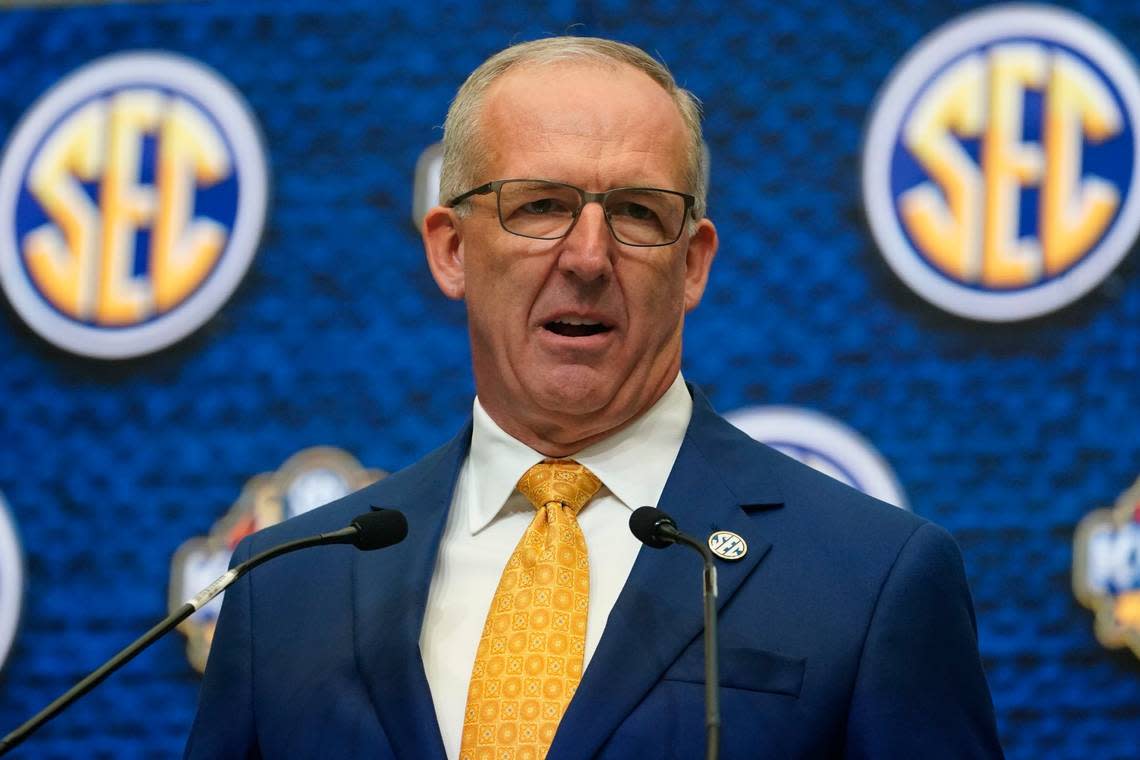SEC commissioner gives his state-of-the-conference message: ‘We are a superleague’

Greg Sankey wasn’t about to beat around the proverbial bush.
As the opening speaker as the league’s annual football days kicked off at the College Football Hall of Fame on Monday, the SEC commissioner was asked a question about the current shifting college athletics landscape and the possibility of superleagues in the future.
“We are a superleague,” Sankey answered.
The commissioner didn’t drop the mic, but he could have.
Actually, the statement was of a piece with Sankey’s 30-minute combined talk/question-and-answer session which pounded home the continuing importance and strength of the SEC in spite of the chaos and confusion permeating college athletics.
For instance, Sankey was asked if the SEC’s addition of Texas and Oklahoma in 2025 trumped the Big Ten’s recent announced expansion into Hollywood with the addition of Southern California and UCLA?
“Yes,” he said, before adding that “I’m not sure we want to use the word ‘trumped’ all the time these days. Got to be careful about that.”
And after reeling off a list of six different SEC schools that have won national championships in college football during the BCS/FBC era — including LSU in 2019, Alabama in 2020 and Georgia in 2021 — he pronounced the league to be “stronger now than at any point in its history.”
That’s not to say there aren’t challenges in today’s choppy waters that the commissioner stressed must be smoothed at some point.
“This is not about tweaking the model we have,” said Sankey, who has been the conference’s commissioner since 2015. “We can’t go on as we are.”
Name, image and likeness appeared to be front and center on his mind, NIL being a messy reality he called “uncomfortable” and, “We’re going to have to manage through that discomfort.”
Sankey decried the patchwork of NIL state laws as “ineffective” and called for a “national standard” and a “common standard.” He confirmed his preference that the federal level provide a national solution, but he admitted he didn’t see the current Congress taking up the matter. Without federal help, Sankey said he would like to see “common state laws among the 11 states in our conference and 12 (when Oklahoma joins) in 2025.”
Then there’s the future scheduling model for SEC football. Both an eight-game model and a nine-game model were discussed during the league’s spring meetings at Destin, Florida, in late May. A consensus wasn’t reached, however, and Sankey insisted there is no deadline for a decision, though Texas and Oklahoma are scheduled to officially join on July 1, 2025.
Sankey even joked Monday that the league could accommodate a 10-game conference schedule, but he quickly added he was only trying to see if his audience was paying attention.
“That’s actually not our focus,” he said.
(That exhale you heard came from Mark Stoops.)
And yes, the SEC is considering eliminating the two divisions. There is ongoing research about how and when, reported Sankey. A long list of potential tiebreakers presented by a 16-team conference was a specific problem that needs to be sorted out.
As for further SEC expansion in the wake of the Big Ten’s surprise announcement at the end of June, Sankey was non-committal. The league is happy with 16 teams, he said. The league does accept calls from other schools, he said. The league is sitting back and assessing the landscape, he said. For now.
(Note: Sankey admitted that while he did project 18 months ago that USC and UCLA might leave the Pac-12, he had no idea the exit was about to happen at the end of June.)
And what about College Football Playoff expansion? A push to expand the field from four to eight or 12 failed in recent meetings, but things could change in the near future. Sankey again indicated he is not in favor of an eight-team format with six automatic qualifiers. In fact, he said he’d be in favor of no automatic qualifiers, whether an expanded format included eight or 12 teams.
Bottom line, Sankey’s main message was the same message he gave to the school’s football coaches in Destin.
“It’s never going to be the same,” he said, “but it doesn’t have to be the way it is.”
Kentucky football receives 2023 commitment from four-star wide receiver from Ohio
To save itself from itself, college football needs to follow the NFL example
SEC football is less than two months away. Here’s a ranking of the league’s coaches.
Kentucky running back Chris Rodriguez pleads guilty to DUI charge, receives penalties
